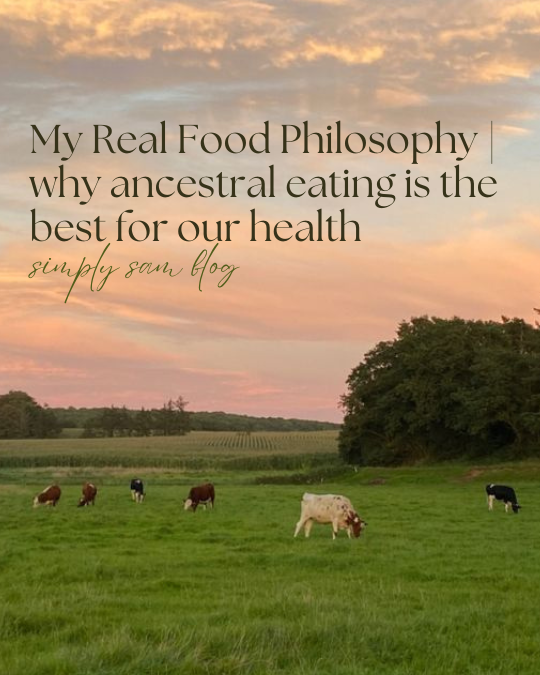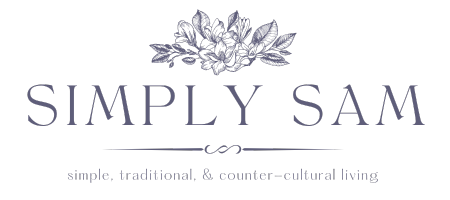The Standard American Diet is doing nothing for us and our health. It’s time to bring back an ancestral way of eating. Our bodies will thank us.

Most of the food that Americans eat on a daily basis is quite frankly not food at all.
The Standard American Diet (SAD) is characterized by high amounts of processed and ultra-processed foods, refined carbohydrates and grains, added sugars, and processed and industrialized fats. Our country is also riddled with diseases like mental health disorders, heart disease, obesity, infertility and hormonal imbalances, autoimmune diseases, and so much more.
Coincidence? I think not.
The saying “you are what you eat” is not just a cute thing you say to little kids. It’s the truth. The food we eat gives our cells what they need to function, and therefore literally builds our bodies.
If we eat the Standard American Diet we’re going to have Standard American Health.
millennials and gen-z are ditching the SAD
Thankfully, my generation is starting to make that connection. We were raised on these things and are now bearing the consequences. I do want to point out that I’m not placing the full blame on our parents. They were lied to and became the victims of persuasive marketing by big corporations and social movements. They were told that mothers don’t need to make food from scratch because processed foods are just as healthy. That it’s okay if families barely have time for dinner because frozen meals are just as nutritious. And worst of all, that the very foods God gave us in nature are the ones causing our diseases.
While I do think the generations before us should’ve had a little bit better critical thinking skills, I can’t blame them for falling for these lies. Especially since the ones spewing them were (and still are) the so-called “experts.”
my real food philosophy in simple terms
So, what is the best way to eat then? Here’s my food philosophy in one simple sentence: stop eating things that God didn’t provide for us Himself in nature. It’s really that simple. If it doesn’t grow on or in the ground, don’t eat it. If it’s man-made in a factory, don’t eat it. For the most part, I follow the traditional and ancestral way of eating outlined in the Weston A. Price foundation’s guidelines.
weston a. price
Weston A. Price was a dentist who travelled the world studying the relationship between dental health and diet. He ended up learning a lot more than that. Here’s a quote from their website about his travels:
Wherever he went, Dr. Price found that beautiful straight teeth, freedom from decay, stalwart bodies, resistance to disease and fine characters were typical of native peoples on their traditional diets, rich in essential food factors. When Dr. Price analyzed the foods used by isolated indigenous peoples he found that they provided at least four times the calcium and other minerals, and at least TEN times the fat-soluble vitamins from animal foods such as butter, fish eggs, shellfish and organ meats… These indigenous people with their fine bodies, homogeneous reproduction, emotional stability and freedom from degenerative ills stand forth in sharp contrast to those subsisting on the impoverished foods of civilization-sugar, white flour, pasteurized milk and convenience foods filled with extenders and additives.
Put simply, the primitive communities who still had an ancestral way of eating stood in stark contrast to the modernized communities that had adopted a more civilized and industrialized diet. And probably not in the way we would suspect. We are led to believe that our diets and food are improving as we make new scientific breakthroughs. But that’s just not the case.
According to Price’s travels, the healthiest and best-looking people were from the primitive communities. They were able to reproduce with ease, had healthy and straight teeth, strong bodies, and a lack of disease. In contrast, the modernized communities had cavities and crooked teeth, disease, and a lack of overall health. Especially in comparison to the former groups.
the weston a price foundation’s guide to an ancestral way of eating
avoid all refined and denatured foods
The diets of healthy, non-industrialized peoples contain no refined or denatured foods or ingredients, such as refined sugar or high fructose corn syrup; white flour; canned foods; pasteurized, homogenized, skim or low-fat milk; refined or hydrogenated vegetable oils; protein powders; synthetic vitamins; or toxic additives and artificial colorings.
include animal foods
All traditional cultures consumed some sort of animal food such as fish and shellfish; land and water fowl; land and sea mammals; eggs; milk and milk products; reptiles; and insects. The whole animal is consumed—muscle meat, organs, bones and fat, with the organ meats and fats preferred.
emphasize nutrient dense foods: organ meats, animal fats, eggs, raw dairy, shellfish and fish eggs
The diets of healthy, non-industrialized peoples contain at least four times the minerals and water-soluble vitamins, and ten times the fat-soluble vitamins found in animal fats (vitamin A, vitamin D and Activator X, now thought to be vitamin K2) as the average American diet.
eat some animal foods raw; cook most vegetables
All traditional cultures cooked some or most of their food, especially plant foods like grains and vegetables, but all consumed a portion of their animal foods raw.
enjoy lacto-fermented beverages and condiments
Primitive and traditional diets contain a high content of food enzymes and beneficial bacteria from lacto-fermented vegetables, fruits, beverages, dairy products, meats and condiments.
prepare seeds, grains and nuts properly to minimize anti-nutrients and enhance digestibility
Seeds, grains and nuts are soaked, sprouted, fermented or naturally leavened to neutralize naturally occurring anti-nutrients such as enzyme inhibitors, tannins and phytic acid.
enjoy saturated fats; avoid industrialized seed oils
Total fat content of traditional diets varies from 30 percent to 80 percent of calories but only about 4 percent of calories come from poly-unsaturated oils naturally occurring in grains, legumes, nuts, fish, animal fats and vegetables. The balance of fat calories is in the form of saturated and monounsaturated fatty acids.
consume animal foods from land and sea to balance Omega-3 and Omega-6
Traditional diets contain nearly equal amounts of omega-6 and omega-3 essential fatty acids. Modern diets based on industrial seed oils can contain almost 20 times more omega-6 than omega-3, because industrial seed oils contain very high amounts of omega-6.
use unrefined salt liberally
All traditional diets contain salt.
include gelatinous bone broths in soups, stews, gravy, and sauces
All traditional cultures make use of animal bones, usually in the form of gelatin-rich bone broths.
emphasize nutrient-dense foods before and during pregnancy, and for growing babies
Traditional cultures make provisions for the health of future generations by providing special nutrient-rich animal foods for parents- to-be, pregnant women and growing children; by adequate spacing of children; and by teaching the principles of right diet to the young.
why an ancestral way of eating is best
There’s a number of reasons why an ancestral way of eating is the best for our health. Here are some of the top ones:
- It is full of important vitamins, minerals, and nutrients that our bodies need in order to be healthy. The SAD is extremely lacking in these things. It’s no wonder we are plagued with so many health issues. Our bodies are very under-nourished.
- It is anti-inflammatory. Many of the things in the SAD are super inflammatory to our cells and bodies as a whole. Things like processed foods, industrialized seed oils, modern grains, pasteurized dairy, and more. Chronic inflammation can lead to chronic stress which can cause even more nutrient-deficiencies.
- It aligns with our biology. The ancestral way of eating is based on human biology and physiology. It provides our cells the things they need to support our bodies. And in turn, our bodies, hormones, and organs do what they’re supposed to do. Of course, our ancestors didn’t study cell biology and human physiology. However, when you look at those things, you find that this “diet” provides everything our cells and bodies need. I think our ancestors innately knew what was needed to support their bodies.
- It supports our digestion and is easily-absorbed by our gut. A nutrient-rich diet is pointless if our bodies can’t absorb those nutrients. A huge part of this way of eating is making sure foods are properly prepared so that they can be digested easily and well. I’ll talk more about that in another post.
want to learn more?
In order to not make this post super long, I’m going to stop there. I plan to talk about my food philosophy a lot in the future. I’ll share more informational posts like this one. But I’ll also share posts that help you eat ancestrally in a practical way. Once I write more posts on this topic, I’ll add them to the “Traditional Foods” section under the “Natural Wellness” tab on my website. Until then, you can check out the Weston A. Price Foundation’s website for more info. You can also read the book Nourishing Traditions and listen to the Wise Traditions podcast.
Come back next Monday for a new post! Thanks for reading 🙂
